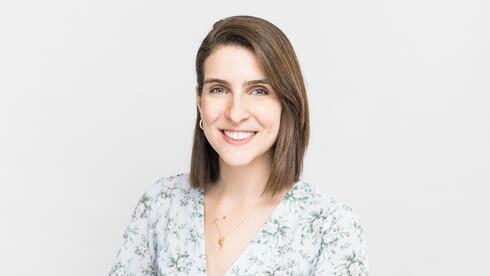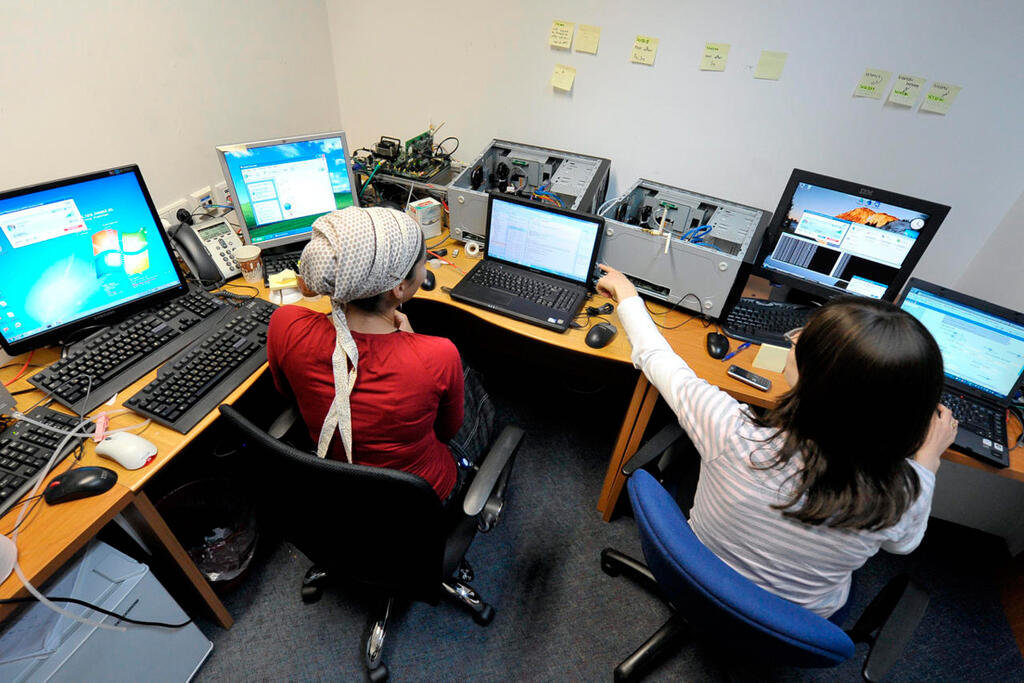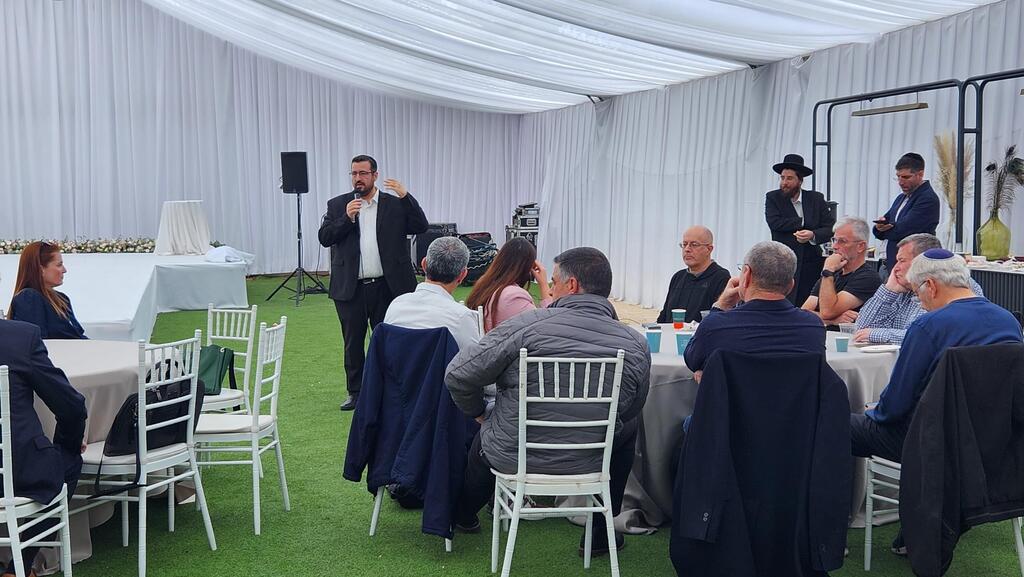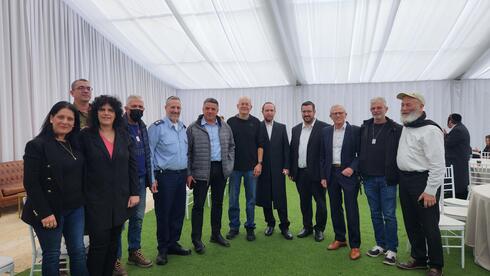
From Seminary to Startup Nation: Could Haredi women propel Israel's tech boom?
Employment and education among ultra-orthodox women, including in tech, is only rising, says a recent Israel Democracy Institute report. This is in part due to initiatives like Ultra-Code, a two-year program that provides haredi women with advanced study and training in technological subjects to help them gain employment in the tech sector
In a large banquet hall in Tel Aviv this past week, about 1,400 young haredi women gathered to write their final exams in advanced mathematics, coding, and engineering after nearly two years of intensive study in the program “Ultra-Code.” Mostly 19 or 20-years-old, these women are part of the sixth cohort of the program, founded by Kama-Tech, which provides advanced education and training for ultra-orthodox, also known as haredi, women to work in the tech sector.
"I really, really enjoy my work. We're accepted as we are - our needs, our values are really understood and respected," says Malki, 21, a back-end developer at defense company Elbit and a graduate from the program who was invited to speak to partners and donors about its impact. Malki says that she wouldn't have gotten to her position without the Ultra-Code program. "It's highly regarded, and it's also the reason we're able to perform at the same level as other employees."
4 View gallery
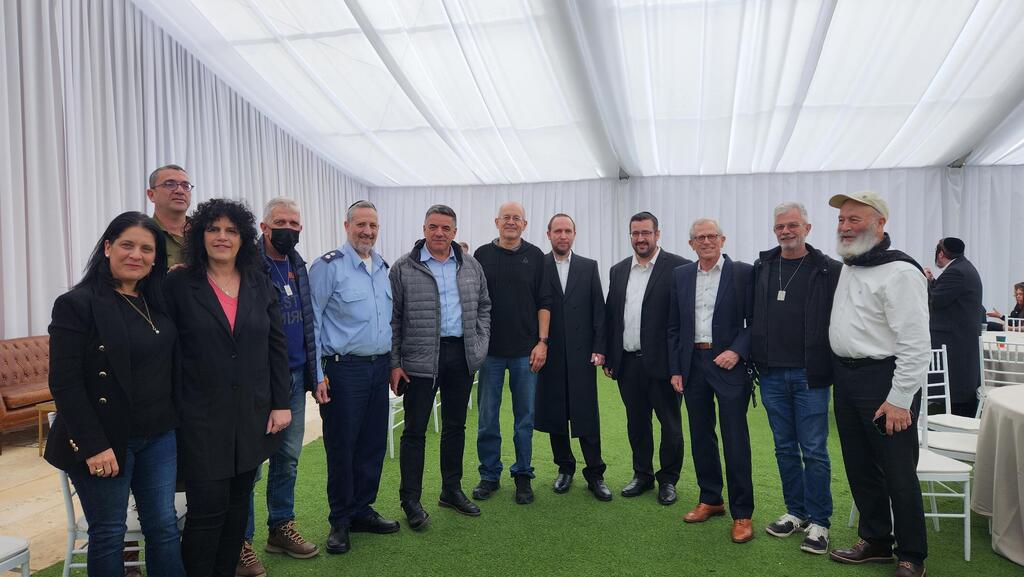

Kama-Tech leaders and partners, including founder Moshe Friedman fourth from the right.
(Credit: Kama-Tech)
Noa, 22, another alumna of the program, is a developer on a client-focused team at Elbit. "We are just like everyone else at the company," she says. Noa points out that the companies participating work with Kama-Tech to help integrate their haredi employees into a secular setting while respecting their values.
Both women heard about the Ultra-Code program from their seminaries. “Those who have the highest grades and are the most serious participate in a separate program. It’s very practical, skills-oriented - not theoretical,” Noa says, noting that she studied algorithms, mathematics, coding, and data science, and that the program recently added an AI track in which the students build their own AI models.
The program operates across 28 seminaries, where most haredi women study following high school, with more than 1,000 haredi women participating. Top students from within the engineering programs at the seminaries are able to apply to Ultra-Code's two-year program for advanced studies in computer science, mathematics, coding, data science, and more. The goal of the program is for students to gain practical skills for employment in the tech sector. The top 200 students are then admitted to 3-month-long tech bootcamps which lead to job placements with major high-tech companies , including Google, Meta, Microsoft, Intel, Mobileye, Qualcomm, Amazon, Cisco, Western Digital, Elbit, Rafael, and more.
Ultra-Code, now in its sixth year of operation, boasts an 85% placement rate of its graduates in Israeli high-tech companies, with an average starting salary of 17,000 NIS ($4,722). The program is the initiative of Kama-Tech, an organization established in 2012 by haredi entrepreneur Moshe Friedman with the goal of integrating haredis into the Israeli tech sector, and is supported by partners including the Shashua Family Foundation, Bank Hapoalim, the Ministry of Labor and the Israel Innovation Authority. Kama-Tech also operates an accelerator for haredi entrepreneurs which has to date resulted in 60 startups, including companies such as Elementor, Triple Whale, and Reflectiz.
Friedman says that Ultra-Code was intentionally designed to address the educational gap that many haredis face when trying to break into the tech sector, as well as to help support the cultural integration of haredi women into largely secular environments. “We work closely with companies to help the women feel integrated into what is often a very new environment for them. We try to make sure that they are placed at companies with other other haredi women, and try to place multiple alumni at the same company when possible so that they won’t feel isolated.”
While Noa and Malki were among the top students admitted to the tech bootcamps, Noa says that just participating in the program gives you a leg up. “Even if you don’t get a job immediately after, the fact that you’ve completed the program is very helpful and also well-regarded.” Noa and Malki both noted that there is a lot of support from the haredi community for the program. “Kama-Tech is very highly regarded, everyone wants to join if they have the grades,” says Malki.
Mimi, a recruitment manager for Ultra-Code, agrees, saying that “the students receive so much knowledge, technical training, practical skills that even if they don’t continue to the bootcamp and place with those companies, they are well equipped to find employment independently.”
“If they weren’t maintaining their haredi identity then there would be opposition within the community,” says Mimi. “But that’s our goal - to help women gain entry to tech companies and to develop professionally, but for them to be accepted as haredi women and to remain as haredi as they were when they started.”
“It’s not mutually exclusive,” says Malki.
‘A win-win for everyone’
A decade ago, haredis accounted for less than 1% of employees in tech, mainly worked in low-salary roles that required less education, and were rarely represented at large companies, Friedman says. “Our goal is to get more haredis into high tech, but also for them to get high-level positions in engineering, coding, data science, and at large companies.”
“Partly due to our activities and other organizations like us, today haredis make up 3.5% of employees in tech, and 10% of new employees are haredi which means that the number of haredis in tech will only increase,” Friedman says, noting that this reflects the growing interest in high tech among both haredi men and women, the latter of whom account for 70% of haredis in tech.
If anything, all recent data shows that the number of haredi women are rapidly rising in higher education and employment, including in Israeli tech. The Israel Democracy Institute recently published its annual report on the haredi community in Israel, which is about 1.3 million people or 13.6% of the population, and with a fertility rate that far exceeds non-haredi Jews, it is expected to comprise 16% of the population by 2030.
According to the IDI report, there has been a significant increase in female employment in the haredi community in the last two decades. The writers note that in 2002, just above half of haredi women were employed compared to 80% today - the highest ever, and not significantly lower than non-haredi Jewish women who have an 83% employment rate.
The report observes that the general rise in employment among both haredi men and women from 2003-2015 was due to “a combination of economic need in the community and of public policy designed to promote entry of haredi Israelis to the labor market by various means.” However, whereas for women the rate of employment has only continued to skyrocket, the employment rate of haredi men has stagnated in the last decade at 53% - significantly lower than haredi women. The report argues that this is likely due to increased state support for yeshivas, which has contributed to a 53% increase in the number of post-secondary yeshiva and kollel students since 2014, reaching 145,067 in 2022.
According to editors of the report Dr. Gilad Malach and Dr. Lee Cahaner of the Israel Democracy Institute, the rise in employment of women is largely due to the fact that “haredi women, unlike many of their male counterparts, participate in an education system that prepares them for the labor market.” This is partly reflected in the higher rate of haredi women who take matriculation exams and study technological subjects, and is in contrast, the reports says, to haredi boys, whose education generally “does not prepare them to hold a job, and the number of haredi men attending college and university remains small.”
In the 2020-2021 school year, 69% of haredi girls took at least one matriculation (Bagrut) exam, 10% higher than the previous academic year, and more than twice the rate a decade earlier in 2008–2009. This is in contrast to haredi boys for whom the rate of those taking matriculation exams, already significantly lower than their female peers, has slightly fallen from 16% to 15%.
The number of haredi women specifically studying technological subjects is also increasing, with 15% of haredi women in post-secondary education studying computer science - a 63% increase in four years. Meanwhile, those studying education, historically the main area of post-secondary education pursued by haredi women, has fallen to 32%.
The report concludes that “there is a clear trend of a rising standard of living among haredi households” that is mainly due to “the substantial increase in the share of women who hold paying jobs and resumed growth in the percentage of men who are gainfully employed, after several years of stagnation.”
Friedman notes that there is also an increasing interest among haredi men to work in tech. “Many haredi men approach us who have already studied independently, including a first degree, but who have had trouble finding work.” He says that they have established a smaller program for haredi men which includes bootcamps and job placement support. While Ultra-Code works closely with the seminaries who already have built-in educational programs for haredi women, most of the men that they work with approach them on an individual basis. But Friedman says that, inevitably, there will only be an increased demand from haredi men for education, training, and programs like Ultra-Code.
“It’s a win-win for everyone,” says Friedman regarding the increasing number of haredis, especially haredi women, in tech. “For the country, for the tech industry, for the economy, and for the development of the haredi community.”






